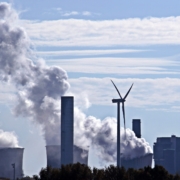Kraftwerk
Kraftwerk means power station in German, but has become well known in English as the name of a pioneering electro-pop group which started in industrial Düsseldorf in 1970. Anglophones might pronounce this like the English word craftwork and mistakenly suppose the meaning is the same, but German w is pronounced like English v and the a here is more like the a in English father. While Kraftwerk’s music is made by humans who sometimes even pose as robots, their use of electronics, synthesizers, vocoders and drum machines sounds the very opposite opposite of crafty kitsch and remains hugely influential and widely sampled to this day. Their albums include Autobahn, Radioaktivität, Trans Europe Express, Computerworld, The Man Machine, and Tour de France.
The noun Kraft means power and the noun Werk means a plant, factory or works where something is produced. In German Kohlekraftwerk is a coal-fired power station, and Kernkraftwerk is a nuclear power station, as the word Kern means core or nucleus, though the Energiewende should see those disappear. Kraftwerk’s name was in fact originally a protest against a planned nuclear power station. Today the winds of change bring on the Windkraftwerk, or Windkraftanlage, or wind farm, but Kraftwerk as a word in its own right has not really entered the English language, except possibly in parodistic usages such as Graffwerk.org.
Interestingly another influential band, the Velvet Underground and front man Lou Reed, emerged from Andy Warhol’s chaotic 1960s collaborative space called the Factory. Warhol too was fascinated with industrial production and replication, famously painting repetitive sets of soup cans.




